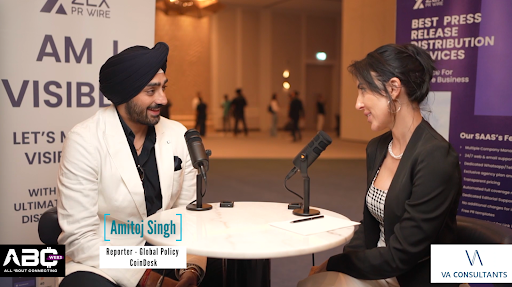Global Regulations in Flux: Navigating the Crypto Maze

“Journalist Amitoj Singh sheds light on the tangled world of cryptocurrency regulations, from the U.S. to emerging markets, as nations race to define the future of digital assets.”
In a recent conversation with Henzie Healley, Amitoj Singh, a prominent journalist at CoinDesk, shared his deep insights into the global policy and regulatory landscape surrounding cryptocurrency. With over 16 years of experience covering topics ranging from politics to digital assets, Singh has observed the rapid evolution of this space. During the interview, Singh discussed the complexity of crypto regulation across different regions and the significant role the U.S. plays in shaping global financial markets.
See Video Interview: https://youtu.be/uN4nEgUk1kM
One key topic Singh addressed was the ongoing ambiguity in the U.S. regarding crypto regulation. He remarked, “The U.S. is the driver of the global economy, and the U.S. still hasn’t regulated crypto. It remains unregulated. Yet, there’s regulation by enforcement.” This highlights the confusion faced by many crypto enterprises due to conflicting oversight from the Securities and Exchange Commission (SEC) and the Commodities Futures Trading Commission (CFTC). Singh explained that these two agencies are “fighting between them about who should really get to control the rules of crypto.” This regulatory tussle has left many crypto companies unsure about the exact legal boundaries they must operate within.
In contrast to the U.S., Europe has made strides toward clearer crypto regulations with the Markets in Crypto-Assets (MiCA) framework. Singh pointed out, “They’ve come up with two sets of regulations, one for stablecoins and one for generally, crypto assets.” The stablecoin regulations have already started rolling out, while broader crypto-asset regulations are expected to take shape by January 2025. Singh noted the importance of these developments, as they could serve as a model for other regions.
While discussing global markets, Singh highlighted Dubai and the UAE as emerging hubs for the crypto industry. “Dubai has the friendliest, in many ways, regulations,” Singh remarked, explaining that the UAE has been proactive in creating a favorable environment for crypto companies by working with them on regulatory alignment. However, he also mentioned recent enforcement actions, noting that Dubai fined several entities for regulatory violations, though the names of the entities were not disclosed.
India also plays a pivotal role in the crypto landscape, with Singh describing it as “the fastest and the most important in terms of crypto adoption.” Despite India’s high adoption rate, Singh explained that it remains a country with unregulated crypto markets, posing challenges for both the government and users. “Crypto exists, it’s happening, but it’s taxed and not regulated, so there’s uncertainty,” he said.
Singh’s reflections on the role of global financial institutions in crypto regulation were also insightful. He explained that organizations like the G7, G20, and the Financial Stability Board are attempting to establish a unified framework for crypto regulations, but the interests of developing countries often differ from those of developed economies. Singh pointed out that stablecoins, in particular, pose a challenge for emerging markets, as they can inadvertently lead to a “dollarized economy,” potentially destabilizing local currencies. He described this as “a big problem” that could have far-reaching consequences for nations like India.
The topic of decentralization in the crypto world was another significant point of discussion. Singh explained the ongoing debate between centralized and decentralized finance, emphasizing that the rise of decentralized finance (DeFi) presents unique regulatory challenges. “The space is moving so fast that we as journalists are finding it overwhelming to cover all that’s happening,” he said. This rapid pace of innovation, coupled with a lack of clear regulations, has created a gray area in which companies and regulators alike are struggling to keep up.
As the interview drew to a close, Singh expressed cautious optimism about the future of crypto regulation, while acknowledging the significant challenges that lie ahead. He concluded by saying, “This is going to take time, and it is a challenge when major Web3 institutions continue to come with new things that need to be regulated.”
Singh’s extensive experience and global perspective provided invaluable insights into the current state and future of cryptocurrency regulation, highlighting both the progress and the roadblocks that continue to shape the industry worldwide.






